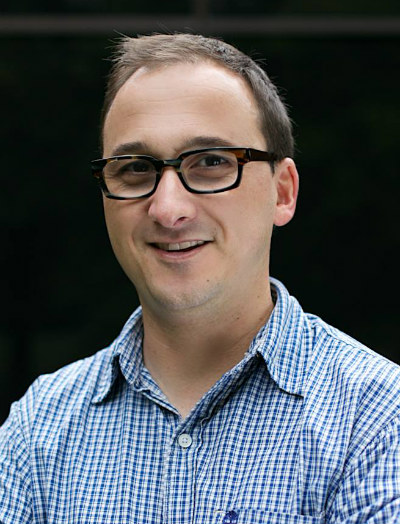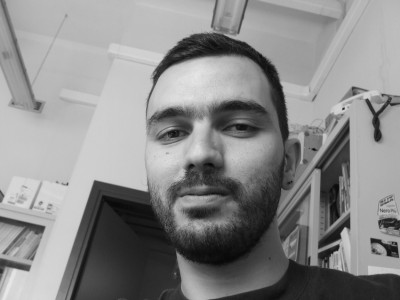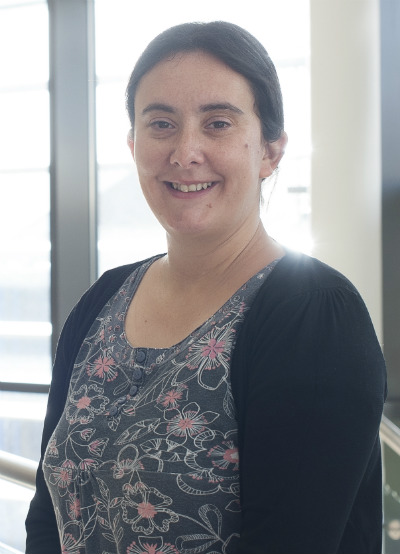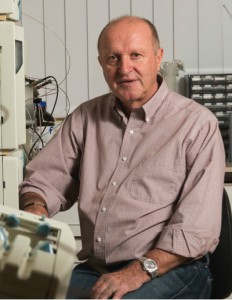
Dr. Federico Rey
Department of Bacteriology, University of Wisconsin
Education
2006 Ph.D. Microbiology. University of Iowa, Iowa City, IA.
Ph.D. advisor: Dr. Caroline S. Harwood
1998 Licenciado en Bioquimica (equivalent to B.S. and M.S. in Clinical
Chemistry). Universidad Nacional de Cordoba, Cordoba, Argentina.
Selected Peer-reviewed Publications (Selected from 25)
1. Seedorf H, Griffin NW, Ridaura VK, Reyes A, Cheng J, Rey FE,
, et al. Bacteria from
Diverse Habitats Colonize and Compete in the Mouse Gut. Cell. 159:253-66 (PMC in
process)
2. Ridaura VK, Faith JJ, Rey FE, Cheng J, Duncan AE, et al., 2013. Gut microbiota from twins
discordant for obesity modulate metabolism in mice. Science. 341: 1241214. (PMC
3829625)
3. Rey FE*, Gonzalez M*, Cheng J, Wu M, Gordon JI. Metabolic niche of a prominent sulfatereducing
human gut bacterium. Proc Natl Acad Sci 110: 13582-7. (PMC3746858)
4. Pluznick J, Protzko RJ, Haykanush G, Peterlin Z, Sipos A, Han J, Brunet I, Rey FE, Wang T,
Firestein S, Yanagisawa M, Gordon JI, Eichmann A, Peti-Peterdi J, Caplan MJ. 2013.
Olfactory receptor responding to gut microbiota-derived signals plays a role in renin
secretion and blood pressure regulation. Proc Natl Acad Sci 110: 4410-15. (PMC3600440)
5. Yatsunenko T, Rey FE, Manary MJ, Trehan I, Dominguez-Bello MG, Contreras M, Magris M,
Hidalgo G, Baldassano RN, Anokhin AP, Heath AC, Warner B, Reeder J, Kuczynski J,
Lozupone CA, Lauber C, Clemente JC, Knights D, Knight R, Gordon JI. 2012. Human gut
microbiome differentiation viewed across cultures, ages and families. Nature 486: 222–
7.(PMC3376388)
6. Faith JJ, McNulty NP, Rey FE, Gordon JI. 2011. Predicting a human gut microbiota’s
response to diet in gnotobiotic mice. Science 333: 101-4. (PMC3303606)
7. Rey FE*, Faith JJ*, Bain J, Muehlbauer MJ, Stevens RD, Newgard CB, Gordon JI. 2010.
Dissecting the in vivo metabolic potential of two human gut acetogens. J Biol Chem 285:
22082-90.(PMC2903421)
8. Faith JJ*, Rey FE*, O’Donnell D, Karlsson M, McNulty NP, Kallstrom G, Goodman AL,
Gordon JI. 2010. Creating and characterizing communities of human gut microbes in
gnotobiotic mice. ISME J 4 :1094-8. (PMC2927777)
9. Rey FE, Harwood CS. 2010. FixK, a global regulator of microaerobic growth, controls
photosynthesis in Rhodopseudomonas palustris. Mol Microbiol 75: 1007–20. PMCID: Policy
Exempt – Not resulting from NIH funding.
10. Mahowald M*, Rey FE*, Seedorf H, Turnbaugh PJ, Fulton RS et al. 2009. Characterizing a
model human gut microbiota composed of members of its two dominant bacterial phyla.
Proc Natl Acad Sci 106: 5859-64. (PMC2660063)
11. Rey FE, Heniger E , Harwood CS. 2007. Redirection of metabolism for biological hydrogen
production by Rhodopseudomonas palustris. Appl Environ Microbiol 73: 1665-71.
(PMC1828789)
12. Rey, FE, Oda Y, Harwood CS. 2006. Regulation of uptake hydrogenase and effects of
hydrogen utilization on gene expression in Rhodopseudomonas palustris. J Bacteriol 188
(17):6143-52. (PMC1595397)
13. Rey FE, Pagano PJ. 2002. The reactive adventitia: fibroblast oxidase in vascular function.
Arterioscler Thromb Vasc Bio 22 (12):1962-71.
14. Rey FE, Li X, Garvin JL, Pagano PJ. 2002. Perivascular superoxide anion contributes to
impairment of endothelium-dependent relaxation: role of gp91phox. Circulation 106 (19):2497-
502.
15. Rey FE, Cifuentes ME, Quinn MT, Pagano PJ. 2001. Novel competitive inhibitor of
NAD(P)H oxidase assembly attenuates vascular O2
– and systolic blood pressure in mice.
Circ Res 89 (5):408-14.
*Contributed equally
Patents
Rey FE, Harwood CS, Flickinger MC. A structured material for the production of hydrogen. US
Patent 7,745,023
Rey FE, Harwood CS. Hydrogen Production from microbial strains. US Patent 20,120,220,006
Gordon JI, Faith JJ, McNulty N, Rey FE, Goodman AL, Kallstrom G, Ridaura V. Cultured
Collection of Gut Microbial Community. WO Patent 2,012,122,522
Professional activities
Ad Hoc Reviewer
Journals: Nature Chem Biol, mBio, Journal of the International Society for Microbial Ecology
(ISME), Applied Environmental Microbiology, Journal of Biological Chemistry, Journal of
Molecular Biology, Scientific Reports, Proceedings B, FEMS Microbiology Reviews.
Funding agencies: NIH (NIBIB, NCCAM), The Canada Foundation for Innovation, Research
Foundation – Flanders (FWO)










